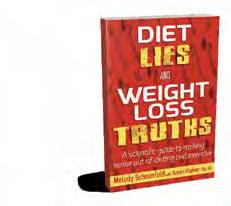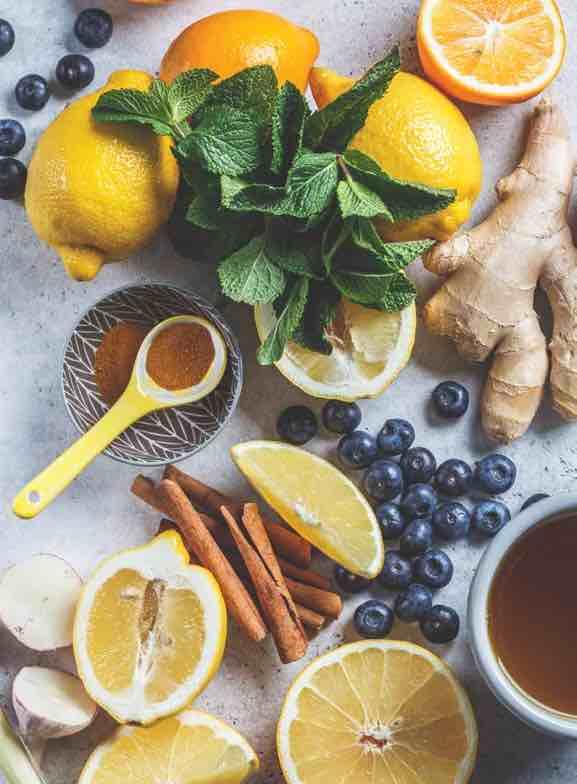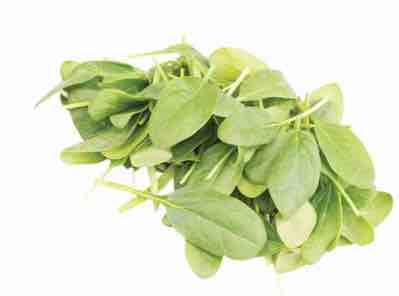
12 minute read
Immune guide
Keeping Your Immune System Strong
Our immune system is one big puzzle, each piece working with the others to create a strong immune defence to keep invaders out. Support the four pillars of immune health—nutrition, exercise, mindfulness and sleep—to boost your immune system.
Advertisement
BY MICHELLE W. BOOK
NUTRITION
Nutritional imbalances have been linked to decreased immunity and increased risk of illness. To help the body identify, break down and dispose of invading bugs, our immune system relies on a diverse collection of nutrients. Macronutrients such as protein, carbohydrates and fat help our system build antibodies, which function to identify and remove viruses and bacteria. To perform to its fullest, the immune system also requires micronutrients like folic acid, vitamins A, C, E, B6 and minerals including copper, zinc, selenium and iron. It’s best to get your nutrients from a rounded diet of whole foods, but lifestyle and dieting habits can o en result in nutritional imbalances. Consider adjusting your supplement routine during cold and flu season to fill in any nutritional gaps you may have and give your immune system the support it needs to keep you going.

EXERCISE
Although it may not always be a good idea to work out while you’re sick, exercise can go a long way in helping you avoid illness in the first place. Exercise protects your immune system by flushing out bacteria in your lungs and airways, improving circulation and causing mild fluctuations in body temperature to fight infection. A daily brisk walk can cut your number of sick days by more than half! Just 30 to 60 minutes of moderate exercise per day can improve your body’s immune response, but modern life means it can be difficult to find time for even this moderate amount of activity.

MINDFULNESS
Stress can have a number of negative impacts on the immune system. Mild stress caused by brief pressures like important exams or tight deadlines at work can suppress the immune system’s ability to break down invading pathogens. Being stressed can also increase the cortisol levels in your system, which makes you more susceptible to becoming sick and more likely to make others sick. Being more mindful can actually help to minimize the occurrence, length and severity of the flu or common cold. It reduces inflammation markers and stress hormones and has been shown to improve activity in the areas of the brain responsible for coordinating the immune system. Make it a daily habit. Consider complementing your mindful routine with a few natural health products. • Valerian can be used as a herbal tea or supplement for its sedative and anxiety-reducing effects. • Fish oil supplementation has been shown to reduce stress symptoms. • Probiotics aid the microbial content of the gut, which plays a key role in immune development.
SLEEP
Your body responds to lack of sleep in a similar way to how it does acute • Melatonin is known for increasing total sleep time and reducing the amount of time it takes to fall asleep.
stress. In fact, our immune system may be correlated with our sleep patterns, and sleep deprivation can impact the activity of our immune cells, making it difficult for your body to identify and fight cold and flu bugs. Michelle W. Book is the in-house holistic nutritionist and spokesperson for Healthier Prioritizing quality sleep can be difficult, by Nature an online community educating but plays a critical role in enhancing your immune defences. Consider the Canadians about the benefits of natural health and organic products. following natural remedies to help improve your sleep: • Vitamin D Your #1 Fitness and Health Resource Provider! can help to promote longer, healthy sleep durations. • Magnesium has been shown to calm the nervous system, induce relaxation, reduce blood pressure and even increase energy during the day. • L-theanine promotes relaxation and better sleep by reducing anxiety.

THE STRESS-IMMUNITY CONNECTION
Protect your elusive human superpower.

BY JENNIFER GRAHAM
TThe biomedical model, aroused in the 17th century, explains sickness as a failure of the body to do its job. Success lies in the good doctor who will “fix” it.
But people are more than their bodies, and immunity is a more complex state of wellness than a doctor can prescribe.
The latest research shows that immunity is a relationship between the mind, emotions and body. Scientists call it psychoneuroimmunology (PNI). This branch of research considers the bidirectional relationship between emotions, activities of the nervous system and immune function. The rest of us call it the “sickness” response. Scientists at the University of Virginia have documented the mindbody connection using functional MRIs. Moreover, the World Health Organization’s constitution defines health as “a state of complete physical, mental and social well-being; and not merely the absence of disease or infirmity.” According to PNI, the “sickness” response is non-specific. Thus, your bad hair day is as much of a threat to your immune system as that Dorito you just ate off the floor. Why? Because the most non-specific threat to the immune system is stress.
Any type of stress (physical, mental or emotional) is a threat to the immune system. If the nervous system is chronically stressed, hormones such as adrenaline (the “fight or flight” response) and cortisol flood the body. This creates dysfunctions including heart disease, depression, poor digestion, chronic inflammation and a weakened immune system. Then, when a virus or bacteria come along, your immune system can’t fight and you get sick. Anything you can do to reduce stress— physical, emotional, or psychological— will give your immune system the strength to fight back. There are many ways to do this. The global wellness economy has grown by more than 10% since 2013. One of the latest therapies for boosting immunity is a gong bath. Gongs have been used since 16,000 BC as healing instruments for anxiety, pain and sleep. In a gong that health was determined by four bodily fluids called “humours:” blood, phlegm and black and yellow bile. And Galen believed that good health came from balancing the “passions:” anger, anxiety and grief. This doesn’t mean that medicine will be reduced to intangibles, or that medical doctors will be replaced by philosophers, sound healers, or emotional self-help books. Rather, broadening the conceptual basis of immunity will require keeping pace with scientific developments. More importantly, the fact that stress uses the loop that triggers symptoms of the common cold means that you have greater control over your health.
bath, participants lie in a supported face-up position and listen to the sound of the gongs for about 45 minutes. The rippling effect of the sound vibration is comparable to that of water over pebbles; think of a babbling brook. The theory is that because our bodies are approximately 70% water, the sound waves “ripple” through the body to calm a chronically stressed nervous system. The heart rate slows, blood pressure drops and breath restores to its natural rhythm. Support for gong baths comes from practicing physicians such as Harvardeducated Dr. Gloria Oberic. She reminds us that “meditative states have repeatedly alleviated or reversed many disorders and disease states … physical, mental, emotional, and spiritual aspects of the body are positively affected by a Gong Bath.” This bidirectional relationship is an ancient one. Hippocrates believed
Jennifer Graham is a writer in Nova Scotia. She practices the “Lost Arts” of cursive writing, paper mâché, pie-making, letter writing, and acts of everyday kindness.
Natural Pain Relief Solution
Let us take care of your pain.
Natural Magnesium Sulfate reduce muscle tension

Organic Arnica Montana reduce in ammation

Pure Essentials Oils increase circulation
epsomgel.ca
Available in Natural Health retailers
PRODUCT OF CANADA
BOOST IMMUNITY with LION’S MANE
In many Eastern traditions, mushrooms are considered superfood. Mushrooms have long been revered for their medicinal properties and health benefits.
BY MICHELLE ARMSTRONG
LLion’s mane mushrooms are a white, edible, shaggy-looking fungi with promising medicinal properties. Their appearance resembles a cheerleader’s pom-pom. When cooked, they taste similar to fresh lobster. Modern research suggests that these funky looking fungi have anti-bacterial and antiinflammatory properties, and they can boost the immune system by encouraging the growth of beneficial gut bacteria.
Multiple studies conducted on mice suggest that lion’s mane mushrooms have strong antioxidant properties and have the ability to lower the risk of diabetes, ulcers, heart disease, and certain types of cancers. Known as the “smart mushroom,” lion’s mane is reported to also improve memory and focus, and help with neuroregeneration (the regrowth or repair of nervous tissues and cells) which can help with conditions like dementia.
To get your hands on some lion’s mane, order online or pop down to your local health food store. You will find that lion’s mane comes in a fresh or dried form, as a supplement or powder.
If you want to cook lion’s mane and incorporate it into your meals, slice it into steaks like you would a portobello mushroom and cook it slowly with butter or olive oil.
Michelle W. Book is the in-house holistic nutritionist and spokesperson for Healthier by Nature an online community educating Canadians about the benefits of natural health and organic products.
@michellearmstrongfit www.michellearmstrongwellness.com

The Life You Save

The immune system strives to protect us from infections and to stop tumours in their tracks. Its job, simply put, is to keep us alive.
BY DAVID WHITTAKER
YYou can look at the immune system as a gi from nature. It works hard to fend off all types of insults to our system. But it’s a two-way deal. If we want all the benefits of a high-functioning immune system, we need to look a er it so it can look a er us.
To help our immune system, we need to eat right and exercise smart. We also need to identify and ignore some myths. Our bodies need fuel and our immune system is no different.
IRON deficiency is the most common deficiency in the world. More than 20% of the world’s population has an iron deficiency—and women are more likely to be affected than men, according to Statistics Canada. Iron deficiency leads to less cell-mediated immunity, which means that white blood cells are not destroying infected or cancerous cells as well as they should be.
ZINC deficiency can cause lymphoid organs, such as the lymph nodes and the thymus, to break down. Lymphoid organ deterioration can be lethal if it occurs at the fetal stage of development. However, excess zinc can also reduce immune function, so check with your doctor to make sure your zinc levels are within a healthy range.
VITAMINS A, B, and E are also important for immune response. People with Human Immunodeficiency Virus (HIV) require a higher intake of vitamins A, B and E, as well as zinc, to maintain normal nutrient levels, according to a study in Nutrition Reviews. Age affects us all differently, but our immune systems all follow a similar trend. As we age our immune system weakens. As the immune system weakens, it also doesn’t recover as well as it used to. This leads us to a common myth: getting sick strengthens the immune system. The unpleasant symptoms you have when you are sick are not caused by viruses or bacteria—they are caused by your own immune system. When you get sick, it is your immune system that gives you fevers, chills, aches, and pains. That is your body’s attempt to kill off the infection. Sometimes we think that getting sick trains your immune system. Like a fighter in the gym—every illness makes you stronger.
In truth, the immune system is more like a student at the library. Every infection is like a new book and as your body goes from healthy to ill, then back to healthy, that book is memorized and antibodies are formed. The next time that book lands on the student’s desk, they read the summary and move on, meaning little-to-no symptoms! So, getting sick lets you memorize more books, but you only need to memorize the books that are on the test. Those books being the common illnesses that you will encounter. When the immune system is fighting off infection, the body also gets damaged as it tries to attack the invader.

When you are young, the body heals fast a er being sick, but as you age the damage caused by fighting off an infection becomes more difficult to heal. That is why those who are older should see their doctor regularly and maintain a balanced diet.
It’s not just what you eat that affects the immune system, it’s what you do. Intense exercise can leave your immune system weak and open to infections for a short period of time. A er exercising, the immune system needs
THE MULTI-TASKING MINERAL FOR YOUR MULTI-TASKING LIFE! (NATURAL CALM: THE BETTER MAGNESIUM)
CELEBRATING 15 YEARS OF CHANGING LIVES
• ESTABLISHED 2005 •
Found wherever natural health products are sold. Follow us on social media for contests and giveaways! naturalcalm.ca
100% of profits are donated to help fight global poverty. thriveforgood.org
to rest. While it’s resting, viruses and other microbial agents may strike, according to a 2016 study by the American Physiological Society. This window can last around six to 24 hours a er exercising, and the severity and length of this window increases if you do not let your body rest before you exercise again. For large lifestyle changes, check with your doctor first to make sure it is the right decision for you.

When exercising, avoid germs by wiping down equipment before use. Wash your hands and don’t share food or drink. Rest is key. Sleep is essential for recovery, even if you are not exercising. Chronic sleep problems can cause inflammation and slow recovery a er illness and even daily activity.
David Whittaker is an OptiMYz contributor with a journalism degree from the University of Kings College. Whittaker often writes about new research in personal health.
Now scented with lavender essential oil

From the same people that brought Natural Calm to Canada, comes Bolton’s Naturals topical magnesium chloride products. Sourced from pure and natural ocean mineral salts, topical magnesium spray, gel and balm help to deliver magnesium where you need it most. Also available with lavender essential oil – for an even more calming, relaxing experience. Plus, Heavenly Sleep Liquid Melatonin, for help getting to sleep and staying there.
boltonsnaturals.com
Linda Bolton










